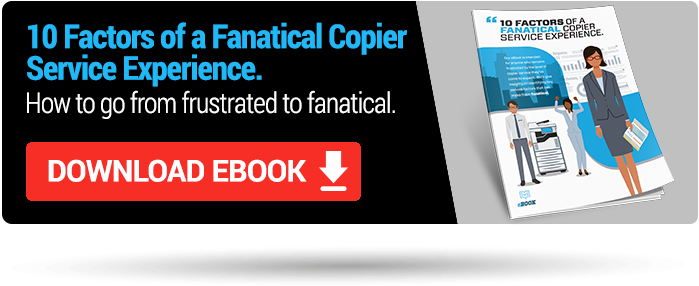
The point is this: Purchasing a copier for the first time (and the proceeding times) can be a daunting task. We're here to help you avoid venturing down the copier procurement process with your proverbial shoes untied.
First-game jitters are a real thing. So are the nerves of first-time buyers.
Be it a house, a vehicle, or a long-term technology acquisition, it's natural to anxiously stew over every possible angle and worry about what you might have missed... and how your decision affects the road ahead for you or your organization.
The best way to grow confidence is through competence. Purchasing a fleet of copiers can be a daunting task, with a lot more to uncover and consider than a simple device and its sticker price. That's why we're here to help. We've outlined 8 critical items to consider so that you can proceed with copier procurement with full confidence.
8 Tips for First-Time Copier Buyers to Boost Their Buying Confidence.
1. Assess your business needs.
Buying a copier that either underperforms or is overkill for your needs affects both bottom line and overall productivity.
With the right partner, you're in luck. A well-vetted copier vendor will perform a proper assessment or "Discovery" process designed to help identify opportunities for streamlining business processes, maximizing the productivity of technology assets and people, and improving your total cost of technology ownership (TCO).
2. Consider Total Cost of Ownership (TCO)
Speaking of TCO... Focusing only on the initial purchase price is a classic copier-buying rookie mistake.
The cost of a copier extends beyond the purchase price. Consider the cost of consumables like toner, paper, and maintenance. Evaluate energy efficiency, as energy-hungry machines can drive up your utility bills. Look into the costs and availability of replacement parts and how often the copier will require servicing. Work with your potential provider to calculate the TCO over the lifespan of the copier to avoid unexpected expenses.
3. Explore your leasing options.
We urge you to avoid signing on the dotted line without at least exploring leasing options.
Leasing can be a cost-effective option, especially for businesses that prefer to avoid large upfront investments and want to prevent technology obsolesce for the foreseeable future. Leasing agreements often include maintenance and upgrades, which can reduce long-term costs. However, be aware of the terms and conditions, as some leases may lock you into long-term contracts that are difficult to exit.
One other item to consider: Does your potential provider an in-house leasing option, which inevitably increases your leasing flexibility AND promotes accountability for them to deliver on service.
4. Don't overlook connectivity and compatibility.
Purchasing a copier that doesn’t integrate well with your existing systems will create a bottleneck in your workflows that might be impossible to break.
Ensure the copier is compatible with your current network infrastructure, software, and devices. For instance, if your business uses cloud storage solutions, verify that the copier can easily connect and upload documents to the cloud. Also, check if the copier supports mobile printing, which is increasingly important in today’s flexible work environments.
5. Think about future scalability.
Buying a copier that meets current needs but doesn’t scale with business growth? Another rookie mistake.
Think long-term. Choose a copier that can grow with your business, either by upgrading its features or handling increased workloads. Modular copiers, which allow for additional trays, finishing options, or enhanced software, are often a good choice for businesses expecting growth.
6. Don't neglect the importance of security.
According to Quocirca's 2024 study, 61% of organizations experienced print-related data loss over the past year. Consider the copier’s security features just as you would any other device on your company's network.
After all, modern copiers are networked devices that store sensitive data. Ensure that the copier you choose has robust security features, such as user authentication, data encryption, and secure erase functions. This is particularly critical for businesses handling confidential information.
7. Ask for a demo.
Plain and simple... try before you buy.
Even in light of a post-COVID era, a demo can be helpful. When applicable, request a demo to ensure the copier meets your expectations in terms of speed, ease of use, and quality of output. Even more, maximize your exploration of multiple solutions by visiting a potential partner's demo floor. One of the greater challenges of copier procurement is having your end users "buy in" to the functionality. During any demonstration, involve the staff who will use the copier most frequently and get their feedback.
8. Take a hard look at service expectations.
Copiers and printers are NOT invincible to routine issues and necessary services. Not factoring in the quality of a vendor's service capabilities can lead to extended downtime and, a consistent thorn in your side.
Ensure the vendor offers strong after-sales support, including prompt servicing and easy access to parts and consumables. Check the warranty terms and consider whether an extended service contract is necessary. Poor support can lead to extended downtimes, which can be costly for your business.
Speaking of service expectations, we've compiled an eBook with insights on exactly what you should expect from a copier service provider. Beyond our in-house leasing program and signature Datamax Discovery process, it's in our DNA to help provide a Fanatical Service experience for all of our Raving Fans. Click below to get your copy of the eBook!

